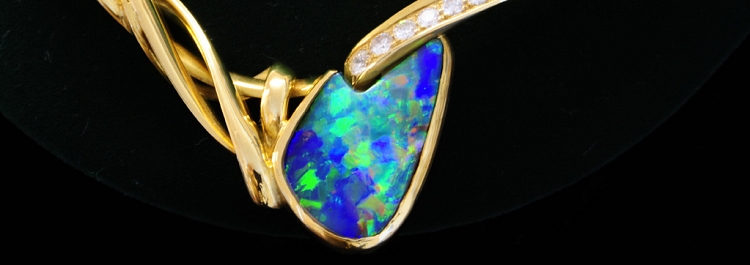Opal Care
Although Opals are a magnificent and unique gem, they do not have the same resistance to breaking or scratching as diamonds or sapphires.
If you protect your stone from heavy blows, abrasive materials, and don't subject it to extreme sudden heat changes, your opal should last forever.
If you have an opal doublet or triplet, never immerse it in detergent ( and preferably not even water ) as this may break down the adhesive quality of the glass.
Treat your precious opals with care as you would any fine jewellery. Solid opals do not require any special conditions to maintain their beauty indefinitely.
However, you should avoid immersing opal doublets and triplets in water, as the glue holding the layers together could be dissolved. A bit of rain won't hurt, but it is best to remove a doublet or triplet ring before putting your hands into sudsy dishwater.
If you wear your opals daily, they could lose some of their polish over a long period of time. In just a few minutes an experienced jeweller can simply re-polish the surface to bring back your opal's original brilliance and shine. Solid opal jewellery (but not doublets/triplets) can also be cleaned in a jeweller's ultrasonic cleaner."
Australian opal is found in sedimentary rocks over 100 million years old. The majority is quite hard and will scratch glass! However there are a few areas that produce unstable material that will crack or craze. It is important to buy your opal from reputable traders who guarantee their stones. Avoid businesses that offer massive discounts.
Solid opal
Australian opal has a typical hardness of 6 to 7 on Mohs scale of hardness. (Pearl = 3.5, tanzanite 6.5, beryl = 7, sapphire = 9, emerald= 7.75.) Opal is quite resilient, but you should avoid situations where the opal could come in contact with abrasives or be subjected to impact, as you would with any valuable jewellery. If you intend to store an opal for a long period in a safe or safety deposit, it is recommended the item be placed in a sealed bag with a dampened cloth. Safes are a de-humidified environment and are unnaturally drying. Follow this simple rule and your opal will give you a lifetime of pleasure and a treasured heirloom.
Triplets, doublets and inlay
It is very important to protect doublets and inlay from impact. On some occasions the opal is just a thin veneer, which is likely to crack if dropped on a hard surface. As triplets, doublets and inlay are laminates the glue could deteriorate if submersed in water and particularly detergents.





